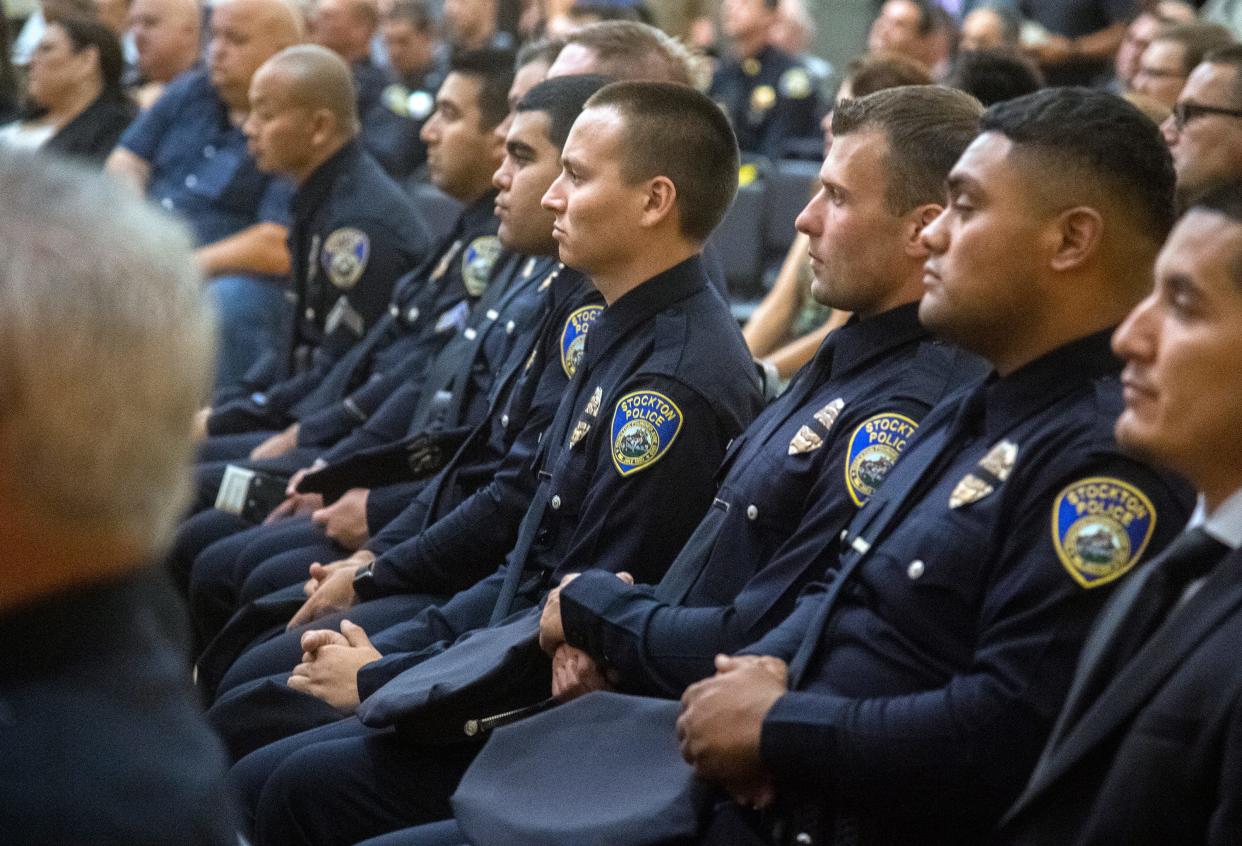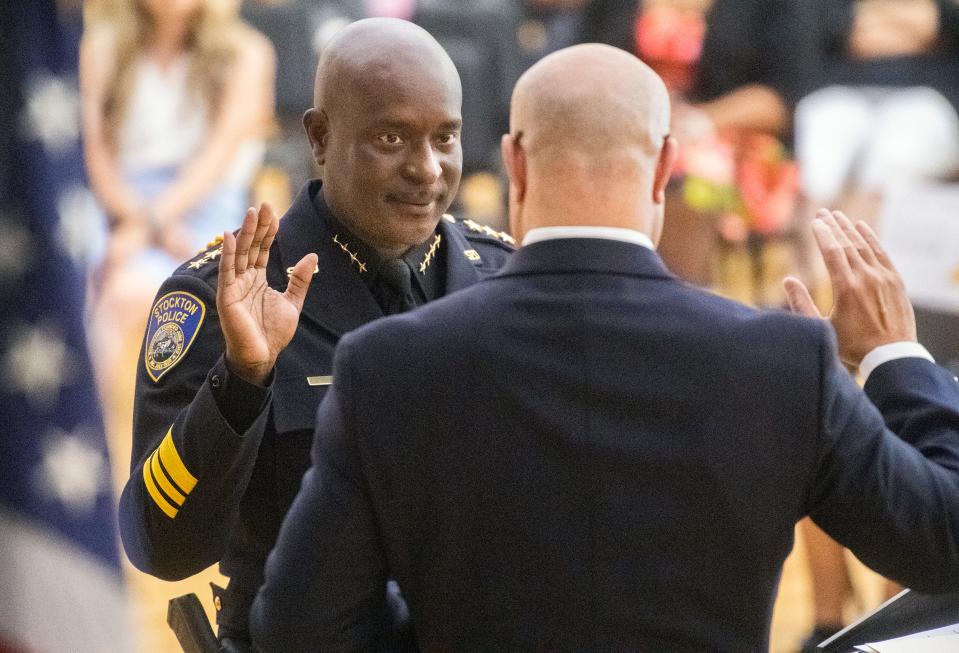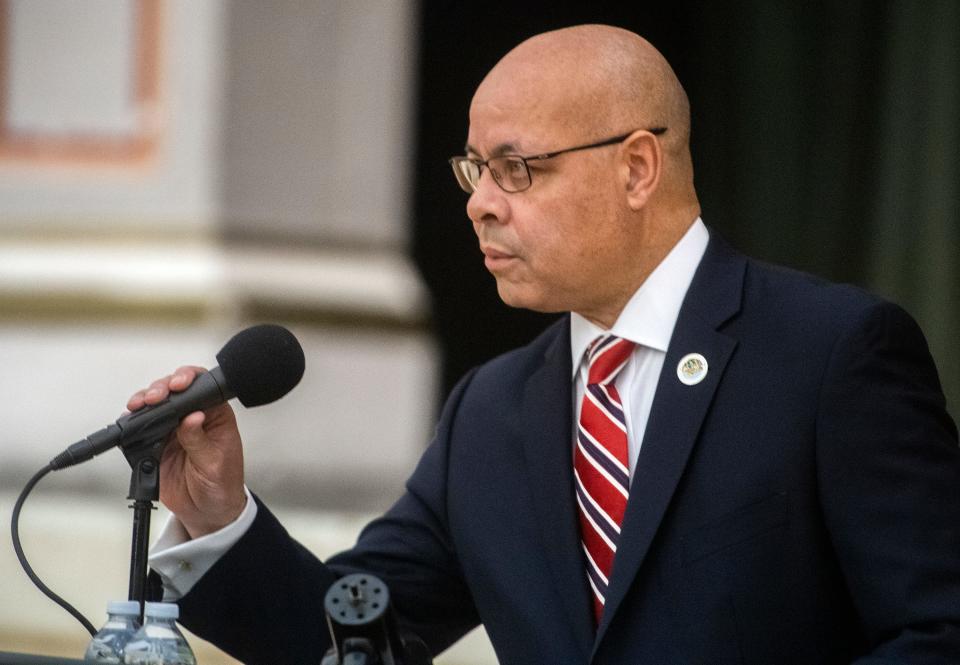Stockton taxpayers will continue to pay sales tax after leaders extend 'controversial' Measure A

Stockton taxpayers will continue to pay for the controversial Measure A for at least another decade.
This comes after the Stockton City Council held two public hearings and adopted an ordinance this week to extend the tax measure.
Measure A is a three-quarter cent transaction and use tax passed by Stockton voters in 2013. It is part of the 9% sales tax people pay when making purchases at stores in the city.
Measure A pledged to add 120 additional police officers, bringing the force up from 365 to 485 sworn officers. It was passed along with Measure B, an advisory measure that said 65% of the Measure A funds would be spent on the Marshall Plan — law enforcement and crime prevention — and 35% would be spent on exiting bankruptcy and recovering from the Great Recession.
The tax was set to sunset on March 31, but will continue through 2034 with the council's vote. Mayor Kevin Lincoln, Vice Mayor Kimberly Warmsley and council members Dan Wright, Michael Blower, Susan Lenz and Brando Villapudua all said "yes" to Measure A. Michele Padilla cast the lone dissenting vote.
If the measure hadn't been extended, Kimberly Trammel, Stockton's chief financial officer, said the city would have become financially insolvent by 2027-2028. She added that the lack of Measure A funds would have prompted "significant cuts" to city services, with the Stockton Police Department being the most impacted.
"No matter which way you do it, the police department is going to be hard hit because they're 55% of the city's general fund," Trammel said, emphasizing that the cuts would have led to a reduced police force and higher response times.
On average, the tax has brought in $36 million to the general fund each year it has been in place and makes up about 17% of the city's general fund revenues, according to the chief financial officer.
Stockton still short on sworn officers
Those opposed to the extension of Measure A argued that the Stockton Police Department is still facing a shortage of sworn officers, nine years after the tax went into effect.
"Stockton police used to be available all the time," resident Cynthia Gail Boyd said, "now Condition Blue keeps them unavailable for hours and days at a time. Why should we pay more to get less?"
Condition Blue, a two-page order addressed from Police Chief Stanley McFadden to all department staff and dated July 5, instructs staff to significantly reduce the number and type of calls to which they send an officer to investigate in-person.
Under the order, police no longer respond to reports of reckless driving, hit-and-runs if the caller can't provide any information pointing to a suspect, and property or financial crimes that have no suspect information.

As of June 30, the department had 364 officers — 121 fewer than the 485 officers it has budgeted for, according to the staff report. The number is just 33 more officers than the department had in 2012, when Stockton declared bankruptcy, a June memo from McFadden addressed to City Manager Harry Black, Lincoln and the city council stated.
Trammel insisted the shortage of sworn officers isn't a sign the tax to combat crime with more police has failed. Data she shared during the meeting showed that 640 sworn officers were hired under Measure A.
"We've more than hired the 120, we've hired the 120 three times over and then some," Trammel said, adding that the department has lost police due to retirement and competition from other agencies.
Community shows up for OVP
Had the extension of Measure A been shut down, Trammel said the Office of Violence Prevention (OVP) would have been forced to close its doors.
OVP works to reduce gun and gang violence in Stockton. One of the office's programs, Operation Peacekeeper, provides mentors to youth and young adults with the highest risk of gang involvement.
During public comment, young men and families who received assistance from the program urged council members to extend Measure A, and keep OVP open.
Sharee Wilburn, who identified herself as a lifelong resident of south Stockton, said OVP stepped in when her son was shot and lost his eye.
"I believe they were probably at the hospital before I got there," Wilburn said. "They offered a lot of support for our family, and for the families that they continue to serve ... they're boots on the ground. They have to remain in place to help our city."
James Stutz of Stockton said he was shot seven times this year. When he woke up in the hospital, OVP was there.
"The lady actually went to my house (and) told my grandma I was shot, went and brought her food and everything," Stutz said, visibly emotional. "They're helping me get my high school diploma, they got me my job, they got (my life) flipped around ... I'm way different."
Calls for more transparency
While the majority of those that spoke during public comment showed support of OVP and the measure, others called for increased accountability and transparency.
"The city used mostly Measure A funds for its new city hall. It seems the city is not proud of that use. There is no disclosure or discussion in the city's documents to show the use of Measure A funds for that purpose," said Ned Leiba, a certified public accountant and city finance watchdog.
Leiba served on the inaugural Measure A Citizens' Advisory Committee. Some members of that committee have long argued the city has not provided enough transparency for the committee to do its job.
“We track and report the Marshall Plan-related expenses that come out of Measure A funds, the rest of it just goes into the big bucket that is the city’s general fund,” Trammel said last year. “There’s not a one-to-one tie for all of the Measure A dollars to specific expenses, and that’s what the committee finds confusing or frustrating.”
Still, former and current advisory committee members have advocated for separate financial statements and audits of Measure A money.
"The past CFO admitted the new city hall was financed from Measure A funds. A simple analysis shows almost all of the funds will be from Measure A, yet not one report, not one word was spoken about that use of funds," Leiba said. "Proper financial statements and audits would show how much of Measure A funds were used, and will be used, for the new city hall."
The city purchased the Waterfront Towers at 501 and 509 W. Weber Ave. for roughly $25 million in 2017, with the intent to renovate the towers and consolidate city services under one roof. As the years went by, the project tripled to $74.5 million, and the buildings still sit vacant. City employees are expected to begin moving into the towers next summer.
Ernesto Gonzalez, chairman of the Measure A Citizens' Advisory Committee, called the city's lack of progress in growing its police force a "management issue."
"After over $300 million of Measure A funds, we are currently at about 347 officers, which is less than where we were before Measure A went into effect ten years ago," Gonzalez said. "For the last three years, police numbers have steadily declined, and the majority of department departures have happened because other local departments pay more."
"Instead of giving raises to top members of the management team and going millions over budget in regards to new city hall project, how about we pay our officers what they deserve?"

Black said the Measure A revision approved by the city council this week will go a long way in fixing those problems.
"From a hindsight perspective, Measure A back then focused and fixated on 120 officers, which was the right thing to do at the time, based on what was going on," the city manager said. "However, it should not allow any flexibility ... you ended up carrying over Measure A money every year, which was not the intent."
The new piece of legislation will reprogram the money to go directly back into the Stockton Police Department, and help with recruitment and retention, according to Black.
"On April 1, it will make Stockton PD highly competitive in the marketplace from a financial standpoint," Black said. "This is a milestone moment."
He added that the city will be implementing recommendations from a performance audit, including providing analytics and metrics, and sharing those in a way that people can understand.
"The transparency will be there, the accountability will be there, the effectiveness of the reprogramming of the money will make for a stronger, more cohesive department."
Record reporter Hannah Workman covers news in Stockton and San Joaquin County. She can be reached at hworkman@recordnet.com or on Twitter @byhannahworkman. Support local news, subscribe to The Stockton Record at https://www.recordnet.com/subscribenow.
This article originally appeared on The Record: Stockton taxpayers will continue to pay for 'controversial' Measure A

